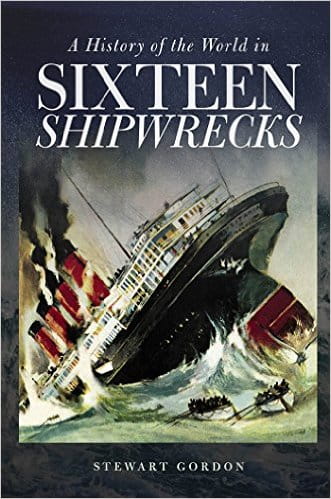
A History of the Worlds in Sixteen Shipwrecks
Robert W. Lebling
Stewart Gordon
2015, ForeEdge, 978-1-61168-540-4, $29.95 hb.
Stewart Gordon, a specialist in Asian history and contributor to AramcoWorld, has produced an intriguing chronicle based on shipwrecks from ancient times until today. Some of the vessels are discovered wrecks; others are lost ships known to history but never found. Each had a significant impact on history, with good archaeological or textual documentation backing up its role. The oldest is a nine-meter dugout carved from an African mahogany tree 8,000 years ago and excavated in Dufuna, Nigeria. The newest is the Costa Concordia, the cruise ship that ran aground off western Italy in 2012. Gordon links each vessel with the world in which it flourished, and shows the spread of globalization via trade, exploration or conquest, excelling at details throughout. Describing the Uluburun shipwreck, a 3,000-year-old Eastern Mediterranean cargo ship found off western Turkey, he notes that the pomegranate seeds and skin fragments in jars amid the wreckage tell much about its trade mission. In those days, pomegranates were grown only in the Caspian region and the tasty red fruits, with a rich mythical lore, were a high-value export destined for tables of the elites of the Levant.
You may also be interested in...

In the Aftermath of Rome's Collapse, These Communities Shaped the Mediterranean
Three regions of the post-Roman Mediterranean, from 400 CE to 1000 CE—the Latin West, Byzantium and the early Islamic world—are the focus of this work.
Child's Play: Reconstructing Everyday Life of Youth in Ancient Egypt
Egyptologist Amandine Marshall observes how the depictions of children created by Ancient Egyptians seldom illustrated their actual lives.
Book Deconstructs Myth Surrounding Egypt’s Most-Famous Boy King
Egyptologist Aidan Dodson sifts the evidence—from tomb paintings to statuary to temple inscriptions—in his quest to recover the real King Tutankhamun.